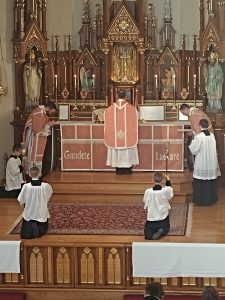QUAERITUR:
Can you explain the difference between gaudete and laetare? Gaudete seems to be 2nd person plural, imperative, while laetare appears to be an infinitive, both seem to mean rejoice in those respective forms. But the roots are different, so is there a subtle difference in meaning? Thanks and happy Laetare Sunday!
Firstly, Laetare and Gaudete Sundays are slight liturgical breathers before plunging back into the last period of preparation before the great feasts of, respectively, Easter and the Nativity of the Lord.
Both Gaudete and Laetare are imperatives. However, laetare only looks like an infinitive because the verb it comes from is laetor, which is deponent (passive in form but active in meaning). There is laeto in Latin, but that is not what’s used here: it is deponent laetor and the form is imperative, just as gaudete is imperative.
The nickames for the Sundays are derived from the first word of the Introit antiphon. Gaudete (plural imperative of gaudeo) is from Philippians 4:4-6 and is Latin for Greek xairéte. Laetare (singular imperative of laetor which is deponent) is from Isaiah 66:10-11 and Latin for Hebrew samah.
There is no substantial difference in meaning between the forms of gaudeo and laetor here. You can go to the context of Philippians and of Isaiah and see if the prophet and the Apostle are talking about different objects of joy. Also, one could go into the weeds and make distinctions about the sense of inward joy and also its outward expression.
Isaiah 66 has the prophet explain how God rewards right worship. He rewards with abundance and blessings. Bad worship… not so much. Philippians 4 says be joyful and peaceful for the Lord is near, so give yourself over to good things.
I will add that in Latin when we sing Lætáre, Ierúsalem, it sounds in Latin as if we are exhorting Jerusalem to rejoice. However, in Hebrew Isaiah says, “(Ya’ll) Rejoice WITH Jerusalem”.
10 “Rejoice with Jerusalem, and be glad for her,
all you who love her;
rejoice with her in joy,
all you who mourn over her;
11 that you may suck and be satisfied
with her consoling breasts;
that you may drink deeply with delight
from the abundance of her glory.”12 For thus says the Lord:
“Behold, I will extend prosperity to her like a river,
and the wealth of the nations like an overflowing stream;
and you shall suck, you shall be carried upon her hip,
and dandled upon her knees.
13 As one whom his mother comforts,
so I will comfort you;
you shall be comforted in Jerusalem. (RSV)
This imagery is the foundation for why this Sunday has also been called “Mothering Sunday”, the original version of Mother’s Day before commercialization.
There are differences in tone between the Lenten and Adventen Sundays, as you might expect. But don’t read much into the forms Laetare and Gaudete. Go to the Biblical context and frame the whole context in the moment of Mass (Introit) and season.



































Not making any particular interpretive claims with regard to these particular passages or antiphons, but I have noticed that many of the verbs which are deponent in Latin seem to have a sense to them akin to the Greek “middle” voice.
I.e. I am no linguist, just an amateur, but lots of deponents seem to have a sense that the subject, by performing the act, is himself also necesarilly a means or object of the act, kind of like a built-in reflexive, yet with the verb still often requiring a proper object or ablative.
Pingback: MONDAY EDITION – Big Pulpit
I’ve noticed that, while on the Sundays in question, both gaudete and laetare are used for the initial directive to “rejoice,” as each introit continues, when they repeat the word “rejoice,” they only use the word “gaudete,” and there is not a reiteration of “laetare.”
There are other forms to be found within the antiphon (laetitia) and verse (laetatus), but the repeated “Rejoice” is “gaudete,” each time.
Laetare Jerusalem, another example of how incredibly ancient the Graduale is. Laetare Jerusalem is clearly based on the Septuagint tradition, and not on the Hebrew Masorete text (which St. Jerome follows with his: laetamini cum Hierusalem et exultate in ea).
So here we should interpret, with the LXX: Rejoice, O Jerusalem,
and celebrate a festival in her, all you who love her; rejoice with joy,
all you who mourn over her.
[YES! Many antiphon texts come from a Latin version that pre-dates Jerome’s! Famously, “Quemadmodum desiderat cervus“.]